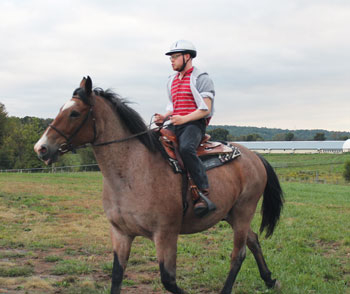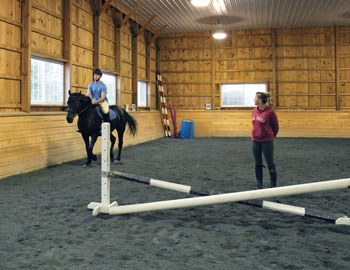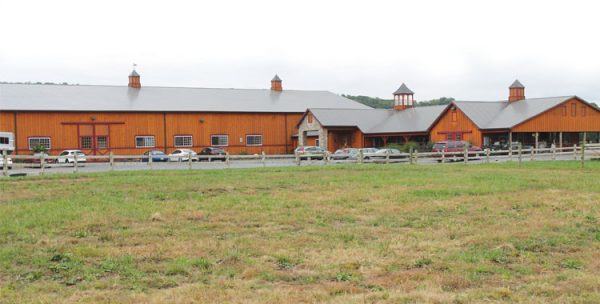Saddle Up for Success
by BusinessWoman magazine / 0 Comments / 397 View / November 1, 2016
“My sister and I were always riding ponies and horses as far back as I can remember,” Laura Rutledge said. “I rode a pony by myself before I learned to ride a bike.”
With that kind of background, it seemed inevitable that Rutledge would someday end up working with horses—and today, she does just that. As the founder and executive director of Triangle Therapeutic Riding, and co-owner with her husband of Stony Run Fields, the ranch that TTR calls home, Rutledge is in her glory.
“My family moved three times when I was growing up,” Rutledge said.

Rachel Sensenig, riding Serena, is building up her core and leg strength and improving her balance. By navigating around photos, objects of interest, and letters around the arena, Sensenig is motivated to look forward instead of down so she can learn to steer her horse.

Johnathan Gehr rides Takoda. Gehr, who has autism, has learned many horsemanship skills and life skills over his eight years of riding, including self-regulation skills to cope when he gets upset or inpatient, like pausing and taking a breath.
Between the ages of 5 and 8, Rutledge lived near a farm in New York that had ponies. Then the family moved to Puerto Rico, where she lived until she was 14.
“We joined an equestrian center where we had very formal, difficult instruction,” she recalls. “I didn’t like it at the time.”
Six years later, the family moved to Pennsylvania, bringing their horse with them, to a house with an eight-stall barn.
“No one else wanted to take control of the barn, so my older sister and I learned barn management with the help of our instructor at the time.”
They took on some boarders and taught basic lessons to the neighborhood kids.
At age 14, Rutledge began volunteering at Thorncroft Equestrian Center in Malvern, Pennsylvania, where she first experienced therapeutic riding and said she knew, even then, that she “wanted to find a way to combine horses and helping people.”
That desire would eventually lead her to a degree from Penn State in therapeutic recreation and then to pass a national test to become a Certified Therapeutic Recreation Specialist (CRTS).
This happily married mother of two worked as a CTRS for several years but found herself back at Thorncroft, volunteering and taking their therapeutic instructor course and obtaining her PATH International Certification. Unfortunately, however, in time she had to resign.
“I loved working there, but my son had some health issues so I needed to find something where I could take a lot of time off,” she said.
Using the knowledge and experience she had gained so far, and relying on her church and her Thorncroft family for support, Rutledge decided it was the right time to start her own small therapeutic riding program.
“I was very blessed to have my neighbors, Kim and Floyd Zook, let me start my program on their private farm,” she recalls. “Later, my neighbors, Susie and Sid Walmer, let me move my program there as we grew. We knew that we would need a less busy place … with an indoor arena and ADA-accessible design for the long term.”

Kendon Garman rides Buster as he takes an English riding lesson with trainer Larissa Ott. Garman is on the equestrian team at the Penn State Berks County campus.

Rutledge rides Aspen, a paint Appaloosa draft cross horse. A young but very gentle horse, Aspen’s demeanor makes him not only an excellent therapy horse, but also a good jumping horse. Aspen is the official veterans program horse for Triangle Therapeutic Riding; he was purchased and donated by the Reinholds VFW.
The relationship between a rider and her horse is a special one.
“Horses have always been my therapist, social center, and physical activity,” Rutledge said. “The oneness felt with horses when riding and on the ground and around the barn is rewarding, uplifting, motivating, but also at times challenging and discouraging. Relationships between horses and people are symbiotic.”
She explained that when the riders feel good about what’s happening, the horse typically does as well, unless he’s in pain, and then it’s the human’s job to pick up on nonverbal cues from the horse.
“The same goes for our clients and horses. When they are having a bad day and come to the barn where the horse is completely attentive to them, they light up when they realize that the horse is connecting with them,” Rutledge said.
Her days are busy, starting early in the morning as she checks on the well-being of the horses and the barn and training staff.
“Managing Stony Run Fields is done with help from my husband, both my kids, and the attentive barn staff,” Rutledge said.
Arena and pasture schedules have to be organized, daily cleaning must be done, health and medical issues facing the horses must be addressed, and endless paperwork has to be handled. But it’s all in a day’s work for Rutledge.
“After all that is taken care of, it’s time to switch gears to the TTR program.”
Again, schedules must be coordinated, equipment must be checked, lessons must be planned—and sometimes, Rutledge even gives presentations to potential sponsors, schools, or local charities. But she and her family don’t do it alone.
“TTR has an amazing group of dedicated volunteers, ages 14 and up,” Rutledge said. “All our volunteers believe in doing everything in the best interest of the horse and rider. Being able to help create positive change for our riders is life changing to us volunteers—it’s a reward like no other.”
Her co-workers have told Rutledge that she should write a book about all of the amazing success stories that have come out of the hard work and dedication of the TTR staff and their horses.
“The latest is a little girl with many sensory issues, nonverbal or no expressive language other than body language, extreme fear issues, moderate intellectual challenges, and a very complicated diagnosis,” Rutledge said.
After working with the TTR program for several months, today, this young girl has made great strides in overcoming her many challenges, and Rutledge said now, they are hopeful that “someday we might be able to hear her speak words … her possibilities are endless.”
All students who attend the TTR program are treated with great respect, something that is very important to Rutledge.
“It gives me great joy when I am helping others and working with others, especially our riders with special needs,” she said. “In a world of so much negativity and people who complain but never do anything to make change, I feel blessed to work with a group of likeminded people who are here to make change. I hope that TTR will continue to grow so we can help more children and adults in our community.”
One of the things that TTR does as a good-will project is to have “visit days” where they schedule a special-interest group to come and check out the program. Some of those have included adults from a group home, learning support classes from local school districts, kids from the inner city, and even groups of veterans. It’s just another way of giving back to the community.
“My grandmother and my caregivers taught me at a young age that giving back is one of the most important things to do because it is what God wants us to do,” Rutledge said. “Giving back to the community is the best place to start with making positive change.”
Her journey to where she is now hasn’t been an easy one, but Rutledge is especially grateful to her husband for “pushing me to work harder and for all of his help,” she said.
“The experiences that came up were far more challenging than I ever expected, but I learned that on days I felt like giving up that I had more strength, determination, faith, and perseverance than I ever thought possible.” BW


Your Commment
You must be logged in to post a comment.